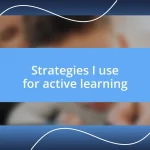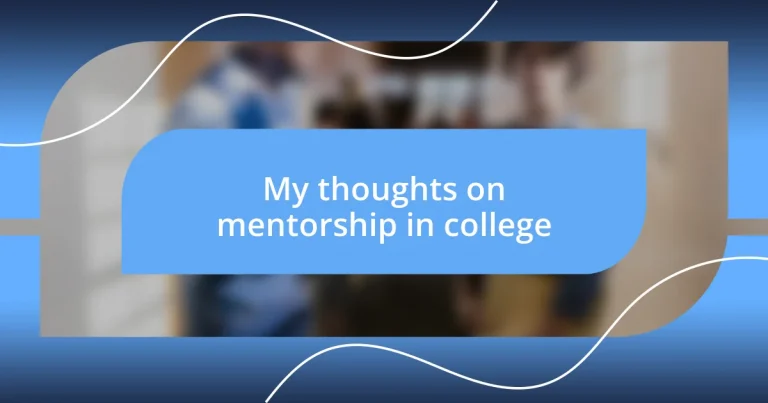Key takeaways:
- Mentorship fosters a transformative relationship built on trust, providing guidance, emotional support, and skill development tailored to individual needs.
- Finding the right mentor involves identifying shared interests and ensuring accessibility, with emphasis on connection over qualifications.
- Successful mentorship requires clear communication, a willingness to adapt, and regular check-ins to build a meaningful and productive relationship.
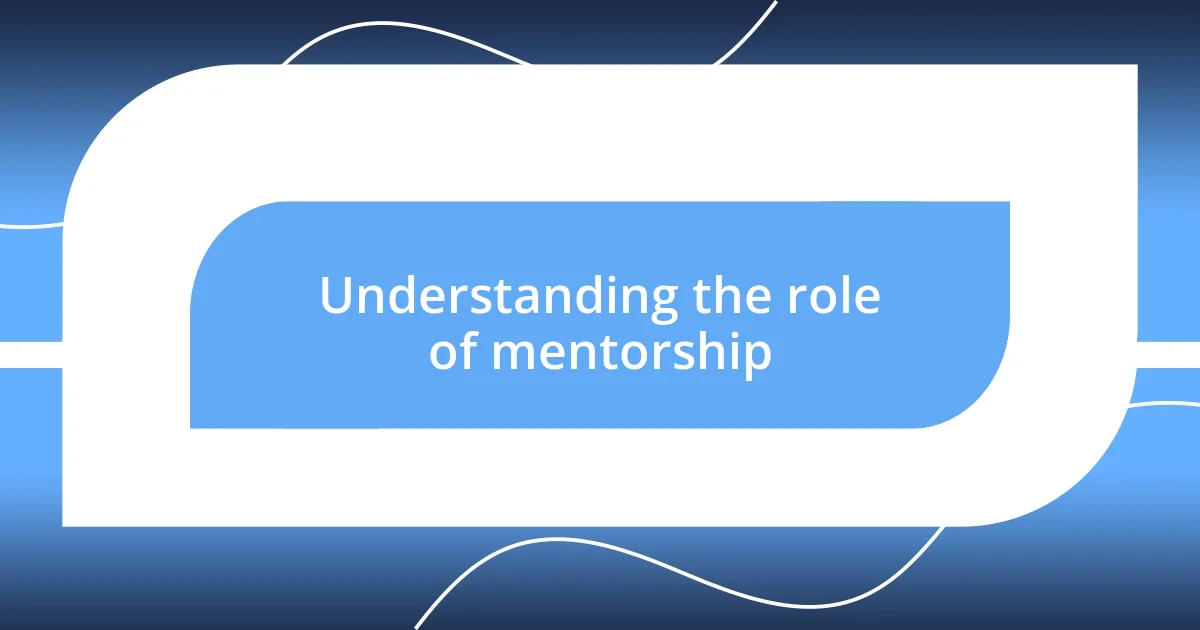
Understanding the role of mentorship
Mentorship in college is more than just guidance; it’s a transformative experience that shapes our academic and personal journeys. I remember my first encounter with a mentor during my sophomore year. I was genuinely lost, questioning my career path and feeling overwhelmed. My mentor didn’t just provide answers; they asked me pointed questions that made me reflect on my passions and challenges. Isn’t it powerful to think how a simple conversation can spark such deep introspection?
At its core, mentorship creates a safe space for exploration and growth. I experienced this firsthand when a professor took the time to discuss my aspirations openly. Their encouragement not only boosted my confidence but also helped me navigate challenges with a sense of purpose. Have you ever felt that reassurance from someone who genuinely believes in your potential? Those moments remind us that mentorship isn’t merely about advice; it’s about connection.
In essence, mentorship fosters a relationship built on trust and shared experiences. It’s fascinating how the right mentor can help you see opportunities where you thought there were only obstacles. I often think back to how my brief interactions with mentors left a lasting impression on my trajectory. How does that make us reevaluate our own influence in others’ lives? The reality is, mentorship can change the course of one’s journey, proving that guidance often comes from unexpected places.
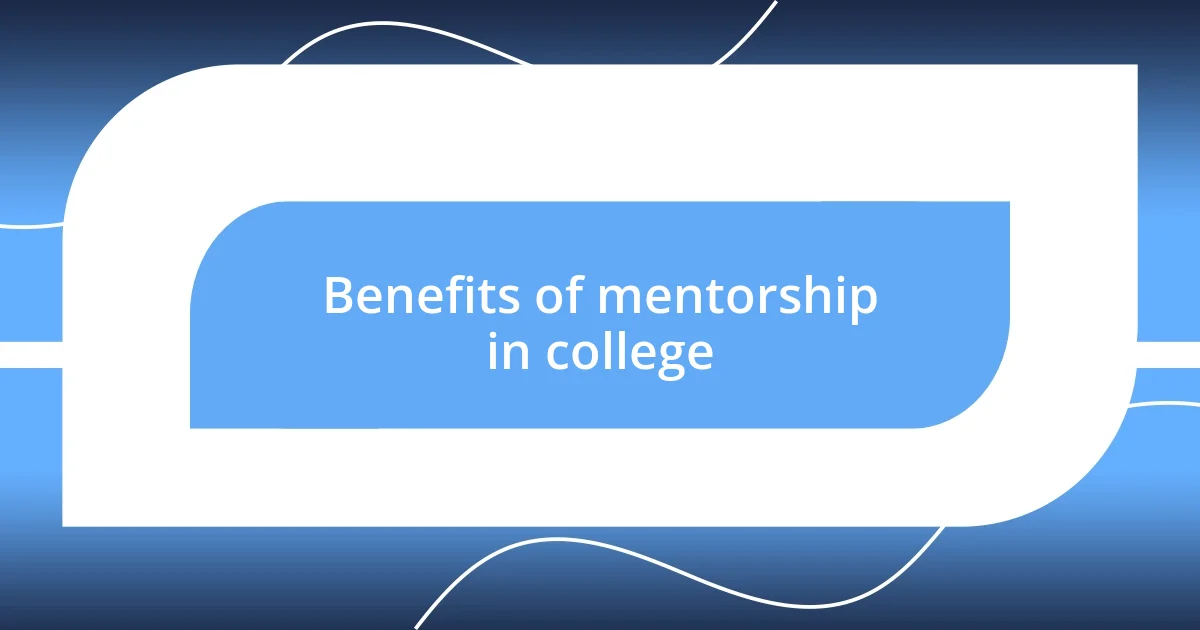
Benefits of mentorship in college
The benefits of mentorship in college are profound and can significantly enhance a student’s experience. I recall a particular instance when I was struggling with time management during finals. My mentor not only shared effective strategies but also related their own experiences of burnout and redemption, reminding me I wasn’t alone in this battle. It was comforting and motivating to hear that even those who seem to have it all together have faced similar hurdles.
Here are some key advantages of mentorship that I think are vital for anyone considering this relationship during their college years:
- Personalized Guidance: Mentors can tailor advice based on their own experiences, allowing for more relevant suggestions.
- Networking Opportunities: Many college mentors open doors to professional contacts that can lead to internships and jobs.
- Emotional Support: Mentors often provide a listening ear, helping students manage the stresses of academic life.
- Skill Development: They offer feedback that can enhance academic skills and professional competencies.
- Accountability: A mentor helps keep you on track with your goals, pushing you to follow through on commitments.
Just thinking about the impact of mentorship makes me grateful for the relationships I built in college. They taught me that we are all on this journey together, navigating our paths with each other’s support. It’s amazing how even the smallest interactions can leave lasting impressions, creating ripples that extend far beyond our time on campus.
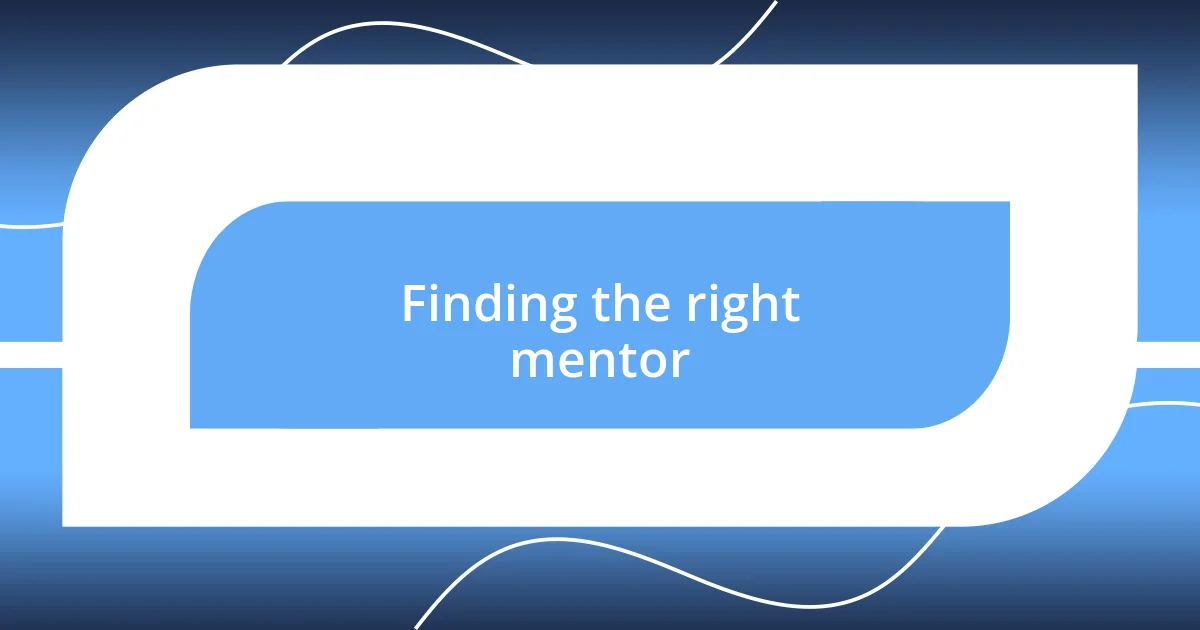
Finding the right mentor
Finding the right mentor can feel like finding a needle in a haystack, but it doesn’t have to be overwhelming. In my experience, the key is to think about what you truly want to learn and who might help you achieve those goals. I once connected with a mentor who not only shared my academic interests but also had similar life experiences. This bond made it easier for me to open up about my challenges, as I felt understood and supported. Have you ever had that kind of connection? It can flip the whole mentorship experience on its head.
Another aspect worth considering is the mentor’s availability and willingness to invest time in you. I had a mentor who was always accessible via email and would set aside time for coffee chats. Having that level of commitment made a huge difference in how much I grew during our relationship. Not to mention, it helped me feel valued and motivated to put the advice into action. It’s a two-way street; a mentor needs to inspire you, and you need to be willing to embrace the learning process.
Ultimately, the right mentor isn’t always the one with the highest title or the most accolades. I learned that some of the most impactful mentors I’ve had were simply individuals who listened and cared. So, consider your options carefully and trust your gut. You might be surprised by who has the potential to guide you on your journey.
| Considerations | Details |
|---|---|
| Connection | A mentor who shares similar experiences and interests can provide a supportive platform for growth. |
| Availability | Look for someone who is willing to invest their time in your development; accessibility can make the mentorship more meaningful. |
| Value over Title | Don’t just go for the highest qualification; sometimes, empathy and willingness to help can be more impactful. |
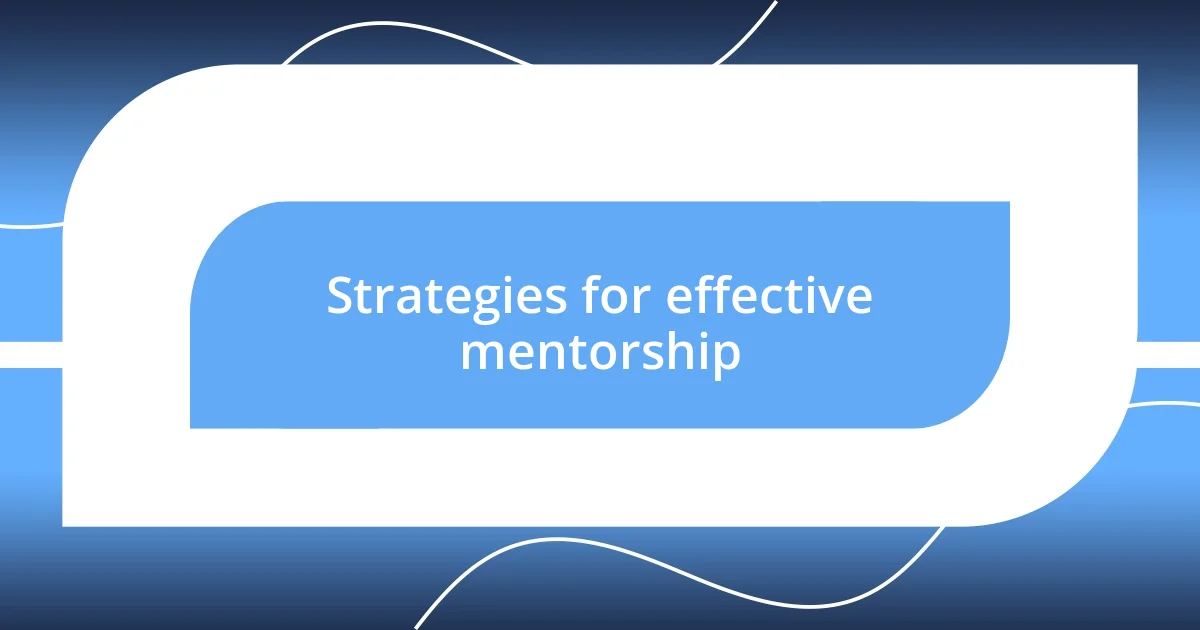
Strategies for effective mentorship
One effective strategy for mentorship is setting clear expectations from the start. I remember my first mentorship meeting where my mentor and I laid out our goals and communication preferences early on. It created a framework that guided our discussions and made us both accountable for our time together. Have you considered how much more effective your meetings could be if you both were on the same page from the get-go?
Another valuable approach is to cultivate an atmosphere of open dialogue. I once had a mentor who encouraged me to voice my thoughts—even when they were uncertain. That environment made me feel safe to share my struggles and led to deeper, more meaningful conversations. When mentors actively foster this openness, it often leads to greater learning opportunities that benefit both parties.
Lastly, mentorship should be a dynamic relationship. I found that my mentor’s willingness to adapt our discussions as situations changed was crucial. Whether it was shifting focus from academic challenges to career aspirations, that flexibility kept our connection relevant and engaging. How adaptable are you willing to be in your own mentorship experiences? Being open to change can turn a good mentorship into a great one.
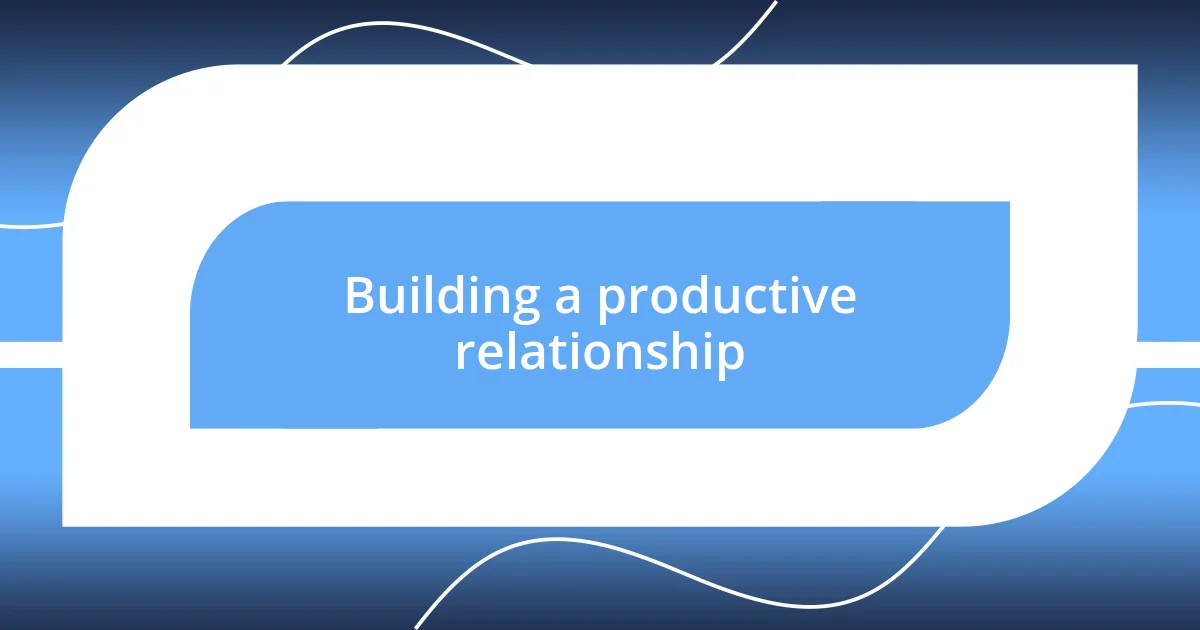
Building a productive relationship
Building a productive relationship in mentorship is all about establishing trust and communication. I recall a time when my mentor asked me about my interests beyond academics. Opening up about my passion for environmental issues led us to have some of the most enriching discussions, where I felt truly seen. Have you ever had a mentor who took the time to understand what you care about? That intentionality can transform a routine meeting into a pivotal moment of growth.
Another critical aspect is providing feedback to one another. I remember an instance where I hesitated to share my thoughts on a project because I feared judgment. My mentor encouraged me, assuring that constructive criticism was part of the learning process. This exchange not only strengthened our rapport but also underscored the importance of collaboration in mentorship; it’s a shared journey, after all. Wouldn’t it be comforting to know that both you and your mentor are learning side by side?
Lastly, consistency plays a pivotal role in building a productive relationship. I experienced this firsthand when my mentor made it a point to check in with me regularly, even outside our scheduled meetings. Those little acts made a significant difference, as I always had someone rooting for my success. How do you think regular touchpoints could impact your mentorship experience? That continuity allows for deepening connections and ongoing support, fostering an environment where both parties can flourish.
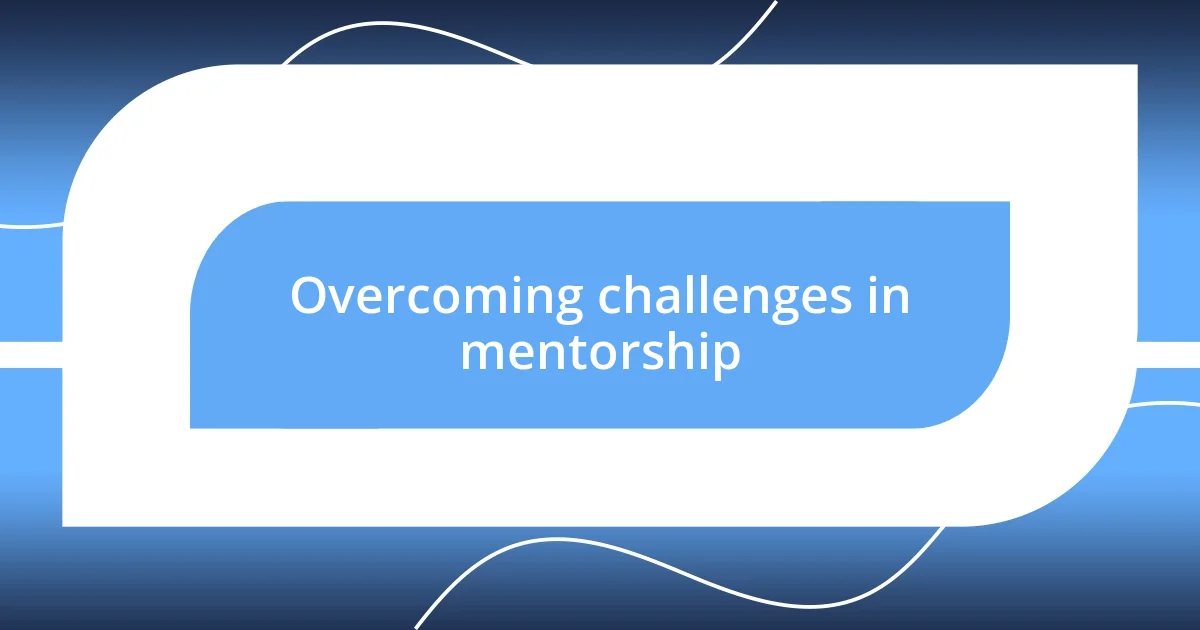
Overcoming challenges in mentorship
Overcoming challenges in mentorship often requires navigating different personalities and communication styles. I remember struggling to connect with one particular mentor because our approaches to problem-solving were worlds apart. It took some time and honest conversations to bridge that gap. Have you tried discussing your communication preferences upfront? That simple step could save both you and your mentor from frustration and miscommunication down the line.
Another hurdle I faced was the fear of vulnerability during my mentor relationships. Initially, I hesitated to open up about my fears and failures, worrying it might reflect poorly on me. However, when I finally took the leap and shared my struggles, I discovered that my mentor had faced similar setbacks. This candidness not only strengthened our bond but also created a space where we could learn from each other’s experiences. Isn’t it inspiring when sharing our vulnerabilities leads to growth?
There can also be logistical challenges, such as scheduling conflicts that disrupt the rhythm of mentorship. I remember a period when my mentor was swamped with commitments, making it tough to secure our meetings. Instead of letting it derail our connection, we brainstormed alternative ways to stay engaged—like quick check-ins via text. Those little adjustments kept our momentum going. Have you considered how flexible scheduling might enhance your own mentorship experience? Adaptability can turn potential setbacks into opportunities for deeper engagement.
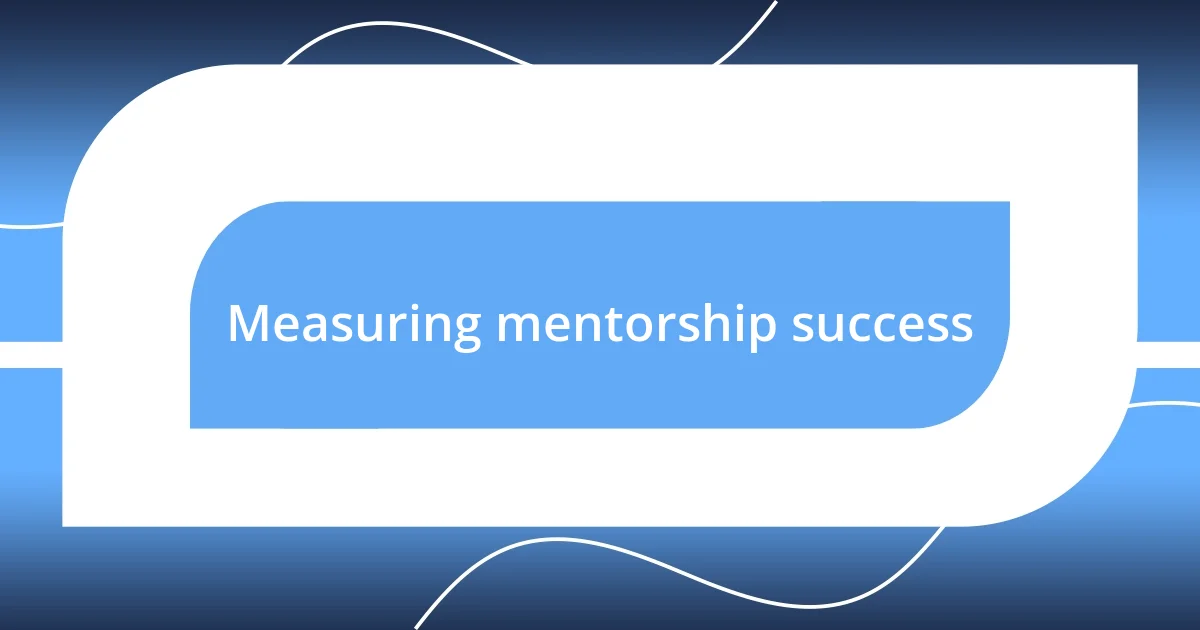
Measuring mentorship success
Measuring the success of mentorship can be a nuanced process that often goes beyond simple metrics. I think about my own experiences where the most impactful moments weren’t quantifiable. For instance, I had a mentor who guided me through a challenging project, and the confidence I gained from that support felt invaluable. How do you gauge confidence and personal growth in your own journey?
Another important factor in assessing mentorship success lies in the feedback loop between mentor and mentee. A memorable moment for me was when my mentor asked me to evaluate our sessions honestly. I felt empowered to voice what methods worked for me and what didn’t. This two-way communication not only improved our relationship but also enhanced my learning. Have you ever had the chance to provide feedback to your mentor in a way that shaped your experience?
Finally, looking at long-term outcomes can also inform how effective a mentorship relationship has been. I often reflect on the stability I felt while working with a mentor who checked in even after our formal meetings ended. Years later, I still apply the lessons learned back then, which speaks volumes about the lasting impact of that mentorship. Do you have experiences where mentorship has influenced your life well beyond college?











